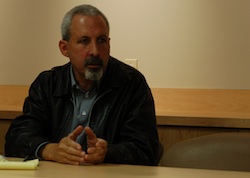By Joel Magalnick, Editor, JTNews
Bradley Burston is concerned about divestment from Israel. But his immediate concern is not the financial divestment and boycotts, though those he finds problematic as well. It’s the emotional divestment he’s seeing from the American Jewish community.
“They are quietly – but in terms of impact, dramatically – withdrawing altogether,” Burston wrote in a column this week at the Israeli newspaper Ha’aretz’s online publication, where Burston is senior editor. These were comments he made to a small group of Seattleites on Oct. 29 while in town as a guest of the pro-peace Israel advocacy organization J Street.
Mostly the Jews he is concerned about are the younger Jews who see anti-Israel rhetoric on campuses, or have a strong distaste for violence, which are often the only images they see when watching news about Israel, and they often will give up on the country right there.
“But it doesn’t mean he can’t be reapproached,” Burston said.
Yet when Burston speaks, usually through his column “A Special Place in Hell,” he’s angry about the problems inside his own country, and what he believes is a slide toward fundamentalist hegemony, particularly in Jerusalem.
When he visits the embattled city, he parks in a lot situated on the site of the now-scaled-back Simon Wiesenthal Center’s Museum of Tolerance, under which lies an old Muslim cemetery.
“This seemed to me tremendously intolerant of the people living in Jerusalem. Not only the Muslim residents who objected to having this Muslim cemetery become a construction site, but also the Jewish residents who are citizens of the most impoverished large city in Israel,” Burston said. “There is a tremendous number of disadvantaged citizens in Jerusalem, and the Wiesenthal center made a decision build a $250 million museum while people are having trouble making ends meet.”
But this lot, he said, is also a meeting place for the city’s young secular population, “which in many ways is an endangered minority,” Burston said. “Secular people are moving out of Jerusalem because of the enormous political power and the growing numbers of religious people — fundamentalist Jews, but also fundamentalist Arabs.”
“Every other community has enormous political clout and access to city hall,” Burston said. “This group has nothing.”
Add to that more issues that have roiled the country internally but have slipped into the discourse of American Jews as well.
At the Jewish Federations of North America’s annual General Assembly in New Orleans this week, for example, a heckler was removed from Israeli Prime Minister Benjamin Netanyahu’s address who chanted that a loyalty oath delegitimizes Israel.
Israel’s foreign minister, AvigdorLieberman and his party, Yisrael Beiteinu, ran — and won — on a platform of proposing that new citizens sign an oath of loyalty to the Jewish State. Now the party has put the measure forth, but even Israel’s right-wing legislators are beginning to feel uncomfortable with the idea.
“A healthy, life-seeking society does not intentionally create conflict with 20 percent of its members,” wrote Knesset member Yehuda Ben Meir of the National Religious Party in an Op-Ed piece for Ha’aretz. “It acts to integrate them into the society and to increase their identification with the state, and not to isolate them and create among them feelings of alienation and hatred.”
Despite the press the oath proposition has received, “if you look at how many of Israelis that actually voted for the party that advocated the loyalty oath — and this was the only party advocating that oath, nobody else would touch it, it was radioactive,” Burston said, “you would find out that only 12 percent of Israelis voted for that party, and I guarantee you in any society you can get 12-and-a-half percent to vote for anything.”
Like many of his fellow citizens, Burston also has issues with government policy on building settlements in the West Bank, or the deportation of people who disagree with Israeli policies, including the Irish Nobel peace laureate Mairead Corrigan Maguire, who in October was banned from Israel for 10 years following her presence on a ship that broke the blockade to deliver humanitarian supplies to Gaza.
Israel today is a society that between 2000 and 2009 suffered its worst decade in its short existence, Burston believes. The country’s election in 2009 was the will of an electorate that was tired and alienated after two wars, suicide bombings, rocket attacks, and the upheaval of the Gaza evacuation in 2005.
“And then world condemnation that came in waves and never stopped,” Burston said. “So what you have is a situation in which a society sees itself under attack by the entire world, and the society has had no rest and no time to recuperate.”
See the other articles in the state of the State of Israel series:
- Rabbi Daniel Gordis of the Shalem Institute
- IDF lecturer and school guidance counselor Rabbi Shalom Hammer
- Daniel Sokatch, CEO of the New Israel Fund.
